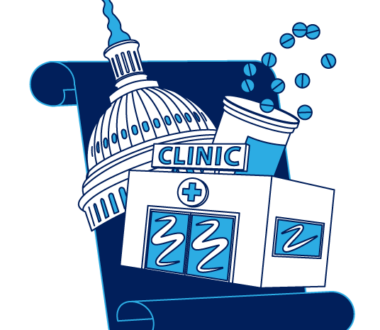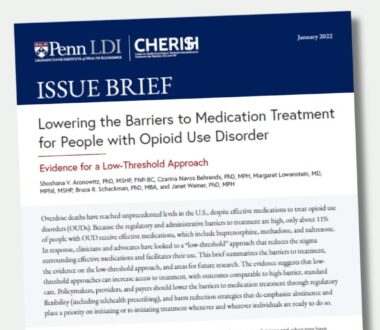
Chart of the Day: Rise in Patients with Opioid Use Disorder Leaving Hospital Prematurely
LDI Senior and Associate Fellows Ashish Thakrar, Margaret (Maggie) Lowenstein, Ryan Greysen, and M. Kit Delgado found that more people with opioid use disorder are leaving the hospital prematurely (or before medically advised), compared to marginal increases for individuals admitted for other reasons. In the study, “Trends in Before Medically Advised Discharges for Patients with Opioid Use Disorder, 2016-2020,” […]

LDI Experts Analyze the New U.S. Plan to Target Xylazine-Laced Fentanyl
The lethal mixture of xylazine and fentanyl, also known as Tranq dope, may sound unfamiliar to many, but its impact is harming people who use drugs nationwide. Xylazine, approved by the U.S. Food and Drug Administration for veterinary use as a sedative, has become a major component in the illicit drug trade. When consumed by humans, xylazine causes […]

New Federal Rules That Lower Barriers to Opioid Care Could Save Thousands of Lives
The two main medications that treat opioid use in the United States reduce overdose deaths by 50%. Yet fewer than one in 10 people with opioid use disorder (OUD) can access this kind of medical protocol, according to the Centers for Disease Control and Prevention (CDC). Fortunately, a new law and a new federal regulation […]

A Catch-Up on Promising Efforts to Mitigate the Opioid Crisis
For the last 20 years or so, the U.S. has seen a significant increase in opioid and drug overdoses overall. And while there was a slight leveling before the pandemic, “we’ve seen huge increases since COVID-19,” said Margaret Lowenstein, an LDI Senior Fellow, addiction medicine physician, and an Assistant Professor of Medicine at the Perelman School of […]

CHERISH Appoints Margaret Lowenstein as the Dissemination and Policy Core Co-director
The Center for Health Economics of Treatment Interventions for Substance Use Disorder, HCV, and HIV (CHERISH) is proud to welcome Margaret Lowenstein, assistant professor at the Perelman School of Medicine and senior fellow at the Leonard Davis Institute of Health Economics (LDI) at the University of Pennsylvania, as the new co-director of the Dissemination and […]

Providing Naloxone in the Emergency Department Can Save Lives
Overdose deaths continue to be a national tragedy. More than 800,000 Americans died from an overdose between 1999-2019, and the annual rate of overdoses has increased dramatically during the pandemic, according to the latest data from the Centers for Disease Control and Prevention. Roughly 7 in 10 current overdose deaths involve opioids, which means that […]

Lowering the Barriers to Medication Treatment for People with Opioid Use Disorder
Overdose deaths have reached unprecedented levels in the U.S., despite effective medications to treat opioid use disorders (OUDs). Because the regulatory and administrative barriers to treatment are high, only about 11% of people with OUD receive effective medications, which include buprenorphine, methadone, and naltrexone. In response, clinicians and advocates have looked to a “low-threshold” approach […]

Starting Opioid Use Disorder Treatment in the Emergency Department: Physician-reported barriers and facilitators
Every day, we hear about the staggering toll of the opioid overdose crisis. This is particularly salient in Philadelphia, which has one of the highest overdose death rates among major U.S. cities. Despite effective medications for opioid use disorder, such as buprenorphine and methadone, few people receive treatment. The ongoing challenge is to expand access to these lifesaving treatments […]

Improving Opioid Stewardship for Acute Pain
As the country faces an unprecedented opioid epidemic, there’s an active national conversation about how inappropriate prescribing contributes to chronic opioid use, misuse, and addiction. Evidence is rapidly evolving to inform the policy debate, especially regarding best practices for prescribing in acutely painful conditions, like an injury or surgery, but the evidence is less clear […]
Engage with CHERISH
Submit a Consultation Request or Contact Us to learn more about how CHERISH can support your research or policy goals.